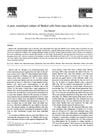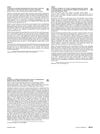 70 citations,
April 2016 in “Experimental Dermatology”
70 citations,
April 2016 in “Experimental Dermatology” A patient with alopecia areata regrew hair after taking tofacitinib and showed changes in certain blood and skin markers.
 12 citations,
February 2003 in “European Urology Supplements”
12 citations,
February 2003 in “European Urology Supplements” Dutasteride reduces DHT more effectively than finasteride.
9 citations,
August 1992 in “The Journal of Clinical Endocrinology and Metabolism”  July 2022 in “Asian Journal of Biochemistry, Genetics and Molecular Biology”
July 2022 in “Asian Journal of Biochemistry, Genetics and Molecular Biology” Ageratum conyzoides may lower blood sugar and improve blood lipid levels in diabetic rats.
19 citations,
October 1994 in “The Journal of Clinical Endocrinology and Metabolism” 7 citations,
August 1996 in “The Journal of Clinical Endocrinology and Metabolism”  6 citations,
August 1996 in “The Journal of Clinical Endocrinology and Metabolism”
6 citations,
August 1996 in “The Journal of Clinical Endocrinology and Metabolism” MK-386 and finasteride together effectively reduce DHT levels, potentially treating acne and male pattern baldness.
1 citations,
October 2023 in “Animals” A small dose of Platycladus orientalis leaf extract improves raccoon dogs' growth and health, but higher doses can be harmful.
 November 2022 in “Journal of Investigative Dermatology”
November 2022 in “Journal of Investigative Dermatology” The extract of Silybum marianum, Manganese PCA, and Lespedeza capitata can boost hair growth and extend the growth phase when combined in a serum.
11 citations,
January 2016 in “BMC veterinary research” Urinary Se to creatinine ratio, serum Se, and glutathione peroxidase are effective early biomarkers for selenium status in dogs.
 11 citations,
September 1996 in “Neuroscience letters”
11 citations,
September 1996 in “Neuroscience letters” Adding fetal calf serum helps Merkel cells survive and change shape.
 8 citations,
February 2007 in “Journal of The American Academy of Dermatology”
8 citations,
February 2007 in “Journal of The American Academy of Dermatology” Higher serum ferritin levels than currently used might be needed to rule out iron deficiency in women with hair loss.
2 citations,
September 1996 in “Neuroscience letters” Adding fetal calf serum to the medium kept Merkel cells alive and changed their shape.
 October 2013 in “The professional medical journal”
October 2013 in “The professional medical journal” Acne severity in women with PCOS is significantly associated with their serum LH/FSH ratio.
 December 2009 in “DergiPark (Istanbul University)”
December 2009 in “DergiPark (Istanbul University)” Check serum ferritin levels and total blood count for women with diffuse hair loss.
 7 citations,
December 2016 in “Journal of The Taiwan Institute of Chemical Engineers”
7 citations,
December 2016 in “Journal of The Taiwan Institute of Chemical Engineers” Pig blood plasma can be used to promote human hair growth and is a good alternative to the commonly used serum additive.
 December 2024 in “Journal of General-Procedural Dermatology & Venereology Indonesia”
December 2024 in “Journal of General-Procedural Dermatology & Venereology Indonesia” The serum effectively reduces hair loss and improves hair growth without side effects.

Combining PRP with Tressfix Serum is more effective for hair regrowth in telogen effluvium than using either alone.
 14 citations,
January 2016 in “Experimental and molecular pathology”
14 citations,
January 2016 in “Experimental and molecular pathology” Giving immune serum from vaccinated mice to mice without T cells prevents infection and tumor growth.
 3 citations,
January 2022 in “Journal of Cosmetic Dermatology”
3 citations,
January 2022 in “Journal of Cosmetic Dermatology” Botox can effectively treat hair loss with some side effects and high cost, while LC hair serum also shows great results with fewer side effects.
 June 2023 in “Sains Malaysiana”
June 2023 in “Sains Malaysiana” Cinchonine Nanostructured Lipid Carriers serum safely and effectively stimulates hair growth and increases the number and size of hair follicles.
 77 citations,
June 2006 in “Best Practice & Research Clinical Endocrinology & Metabolism”
77 citations,
June 2006 in “Best Practice & Research Clinical Endocrinology & Metabolism” The document concludes that accurate measurement of serum androgens is crucial for diagnosing hyperandrogenism.
 3 citations,
August 1996 in “PubMed”
3 citations,
August 1996 in “PubMed” Finasteride reduces prostate size and serum levels, helping manage benign prostatic hyperplasia, without affecting prostate cancer detection. Regular monitoring is needed for users.
 August 2019 in “Journal of The American Academy of Dermatology”
August 2019 in “Journal of The American Academy of Dermatology” PFD patch helps laser tattoo removal, trichoscopy diagnoses AGA, and serum boosts SOD activity.
 815 citations,
April 2010 in “The Journal of Clinical Endocrinology & Metabolism”
815 citations,
April 2010 in “The Journal of Clinical Endocrinology & Metabolism” Women with PCOS should be screened for heart disease risk and manage their health to prevent it.
 491 citations,
July 2000 in “The Journal of Clinical Endocrinology and Metabolism”
491 citations,
July 2000 in “The Journal of Clinical Endocrinology and Metabolism” Polycystic ovary syndrome is found in 6.5% of unselected Caucasian women in Spain.
 343 citations,
October 2015 in “Endocrine Practice”
343 citations,
October 2015 in “Endocrine Practice” The guide recommends specific methods for diagnosing PCOS and various treatments for its symptoms, while considering the health impacts on adolescents.
 282 citations,
April 2007 in “Journal of Agricultural and Food Chemistry”
282 citations,
April 2007 in “Journal of Agricultural and Food Chemistry” Apple polyphenol, especially oligomeric procyanidins, can reduce fat absorption and lower blood fat levels.
241 citations,
March 2000 in “The Journal of Urology” Men over 50 may experience hormone decline causing various symptoms, and proper management is crucial.
 239 citations,
July 2002 in “Clinical and Experimental Dermatology”
239 citations,
July 2002 in “Clinical and Experimental Dermatology” Low iron and L-lysine levels can cause hair loss in women, and increasing these nutrients can reduce hair shedding.






















